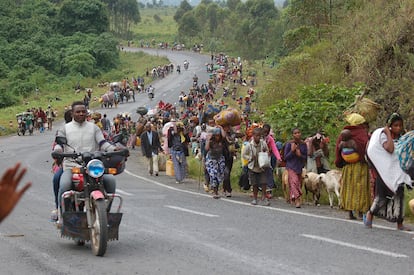A regional African force comes to help Congo stop the rebel group M23
Angola to send a contingent to DRC to try to force the militia to comply with a ceasefire and avoid an escalation in the region. Kenya and Burundi have already sent troops, while Uganda and South Sudan plan to do so in the coming months

The conflict in the northeast of the Democratic Republic of the Congo (DRC), which pits the army against the rebel group M23, has made short shrift of a recent ceasefire and spurred neighboring countries into action in a bid to contain an escalation that is destabilizing the entire region. Angola’s president, João Lourenço, intends to deploy a military unit to Goma, in the northeast of the DRC, to try to get the M23 to return to its bases and comply with the terms of a truce that should have entered into force on March 7. Kenya and Burundi have already sent troops as part of the East African Community Regional Force supporting the DRC, and Uganda and South Sudan are expected to follow suit in the coming months.
Meanwhile, the clashes between Congolese troops and the M23 – backed by Rwanda according to the United Nations, although the government in Kigali denies the accusations – have intensified in recent days: the insurgents are trying to cut off all access routes to Goma, capital of DRC’s North Kivu region, and fighting has taken place about 30 kilometers (18.6 miles) from the city.
The offensive launched a little over a year ago by the M23, a group with a Tutsi majority, has led to the reactivation of an old conflict that began in the late 1990s and never fully died down. The fighting, the presence of rebels at the gates of Goma, the massacres of civilians, such as the one last November in Kishishe and Bambo that claimed the lives of 131 people at the hands of the rebels, and the displacement of some 800,000 Congolese from their homes, according to a UN calculation, all contributed to the decision to send troops from the countries of the East African Community (EAC). Since November, around 900 Kenyan soldiers have been present in the area, while around 30 Burundian soldiers arrived on March 5.
This conflict goes back to the Rwanda genocide of 1994, when government forces and Hutu militias murdered nearly a million people, mostly Tutsis, in just three months. After the Rwandan Patriotic Front (Tutsi) seized power, millions of Hutus, including perpetrators of genocide, fled to the DRC, where fighting between the two groups continued. The current M23 group was born in 2012 and is the heir to those Tutsi guerrillas who were fighting in the DRC’s northeast with Rwandan support. In November of that year, the members of M23 managed to occupy the city of Goma, but a counteroffensive by the Congolese Army forced their withdrawal and surrender in 2013. Then, in November 2021, this rebel group re-emerged with an offensive against Congolese forces.
The transfer to DRC’s northeast region of a military contingent from Angola, which is mediating in this crisis by designation of the African Union, requires the approval of parliament, which was scheduled to debate the issue this Friday. Although it is still unknown how many soldiers will make up this military unit, its goal is not to participate in any offensive, but rather to “secure the M23 cantonment areas and protect the members of the ad hoc truce verification mechanism, led by an Angolan officer,” specifically by General Joao Massone, according to a statement from the Angolan presidency.
DRC Foreign Minister Christophe Lutundula said on Tuesday at a news conference that an Angolan Army battalion will be tasked with enforcing the provisions of the Luanda peace process, in particular M23′s withdrawal to its bases; so far, this group has broken the ceasefire terms of March 7, as well as other previous truces. “President Lourenço has informed presidents Tshisekedi [Congo], Kagame [Rwanda], Ruto [Kenya], Ndayishimiye [Burundi] and Samia Suhulu [Tanzania]”, added the minister, in addition to maintaining close contact with the EAC’s designated mediator, former Kenyan president Uhuru Kenyatta, and with the M23 itself, which has been informed of this troop movement.
A delegation from the United Nations Security Council traveled to Goma last week to observe the situation first hand, after which they insisted on the need to seek a negotiated solution. “The way out of this crisis can only be political, through negotiation,” said Nicolas de Rivière, French ambassador to the UN, who once again pointed at the Rwandan government as the financial backer and supporter of the M23 rebel group. The Congolese government is reluctant to yield an inch to what it considers the aggression of another country on its territory, especially at a time when President Félix Tshisekedi is risking his political future, with elections scheduled for the end of year against rivals like Martin Fayulu or Moïsse Katumbi. “It is out of the question to negotiate with the M23,” said Patrick Muyaya, spokesman for the Congolese executive, at the end of February, while Minister Lutundula insisted on describing the insurgents as “terrorists.”
In the city of Goma, the situation is increasingly stifling. Thousands of displaced persons are arriving practically every day as a result of the attacks and movements of the M23, with special intensity around the city of Saké, close to the regional capital, and in the towns of Kirotshe and Shasha, on the edge of Lake Kivu. The Congolese Army has been incapable of containing this offensive and relies on armed groups such as the Mai Mai and the Democratic Forces for the Liberation of Rwanda (FDLR), with a Hutu majority. For now, the Kenyan and Burundian soldiers of the EAC regional force have refrained from participating in the fighting, as well as the members of the UN mission in the DRC (Monusco). The population of North Kivu accuses these foreign forces of inaction.
On the other hand, suspected militants of a Jihadist group of Ugandan origin, the Allied Democratic Forces (ADF), assassinated 19 people last Sunday in the town of Kirindera, in the North Kivu region. This attack took place a few kilometers from Mukondi, where the ADF also killed another 35 people last week. On February 28, the Congolese Army assassinated Fezza Mulalo aka Seguja, considered the number three official within this terrorist group with ties to the Islamic State, according to reports by the Armed Forces themselves.
Sign up for our weekly newsletter to get more English-language news coverage from EL PAÍS USA Edition
Tu suscripción se está usando en otro dispositivo
¿Quieres añadir otro usuario a tu suscripción?
Si continúas leyendo en este dispositivo, no se podrá leer en el otro.
FlechaTu suscripción se está usando en otro dispositivo y solo puedes acceder a EL PAÍS desde un dispositivo a la vez.
Si quieres compartir tu cuenta, cambia tu suscripción a la modalidad Premium, así podrás añadir otro usuario. Cada uno accederá con su propia cuenta de email, lo que os permitirá personalizar vuestra experiencia en EL PAÍS.
¿Tienes una suscripción de empresa? Accede aquí para contratar más cuentas.
En el caso de no saber quién está usando tu cuenta, te recomendamos cambiar tu contraseña aquí.
Si decides continuar compartiendo tu cuenta, este mensaje se mostrará en tu dispositivo y en el de la otra persona que está usando tu cuenta de forma indefinida, afectando a tu experiencia de lectura. Puedes consultar aquí los términos y condiciones de la suscripción digital.









































